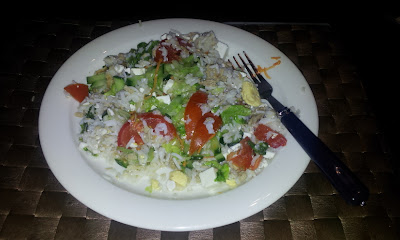We usually have a lunch buffet at work every second Friday together with some project presentations. Today, I was disappointed to see a big unopened box of huge chicken legs be thrown to waste, because it had gone unnoticed at the bottom of the keep-it-warm box. Together with all the thrown-away rice and salad, that would have made some 20 meals. Unfortunately, I didn't have my leftover containers with me, so it was thrown away. Well, the chicken would have been difficult to warm up again later anyhow.
Luckily that was exceptional - we usually have some like myself who take the leftovers home. I'm not saying that everyone should participate, as there wouldn't really be enough leftovers for many people, but there should always be some to take care of it. I'm perfectly happy to be able to get a full week's food for free on some occasions. Our company may be exceptional, in most places such leftovers are probably just thrown away.
For another example scenario, some years ago I was at a meeting at the Ministry of Education of Finland. As is the custom at meetings, there was some snacks served. Quite a lot actually, bread, butter, ham, cheese, tea, coffee, etc. In this meeting, there was exceptionally much and the participants ate only about half, while the other half was left over. At the end of the meeting it became obvious to me that they would have been thrown to waste. Being a bum, I collected the leftovers and ate them for several days. After that, I've tried to have some containers for the leftovers in similar meetings.
One problem seems to be in the social conventions involving offered food. In normal human social behavior, collecting leftovers would also be a sign of low socioeconomic status, suitable mainly for a bum, and most people avoid that instinctively. Given that the offered food is intended to be shared jointly, collecting the leftovers would also be a sign of greed, taking more than your share, even a bit like stealing if you are not the host. Also, if not everyone participates in the collection of the leftovers, which would not even be practical, collecting them would make you nonconforming, which is rarely socially a good thing.
It could also be considered a "luxury situation" where you are being served or indulged. Being free of problems is part of and a form of indulgence, so you assume that the fate of any excess food should not be your concern, but somebody else's. Going further, it's one thing to take some leftovers from the table, but it would indeed be considered quite odd and exceptional, for example, to go to the kitchen and ask for the leftovers. The purpose of free snacks is not to give you economic support, but to make the occasion more enjoyable.
For meetings and parties arranged at someone's home there is probably less waste, as the hosts can collect the (untouched) leftovers and perhaps do something useful with them.
It is more common to keep the leftovers that you personally paid for. Restaurants around the world offer "doggy bags" specifically for that purpose. Surprisingly, the use of doggy bags is more common in US that in Finland, even though the proportion of domestic food waste is as high as 50% in the US. One reason could be that the US restaurant portions are huge, while in Finland the portions are usually such that almost everyone can eat them. The restaurant cultures are quite different in different countries. For example, in Middle-East, many common meals such as mezes are replenished as you eat them, and after you finish, quite a lot of food is thrown away. In one country leaving food on the plate could be considered rude - it signals that it wasn't good enough - while in other countries the opposite - it signals that there wasn't enough of it.
Globally, some one third of all produced food is wasted. Given that food production one of the biggest causes of global ecological problems, this is a huge problem. With overpopulation, economic rise of the Asia, biofuels, and loss of arable land to erosion, the rising cost of food can become a significant contributor to social division and unrest in the world.

The good aspect is that you don't have to care about the penguins, seals, kittens, or the hungry poor. You can just think about your own wallet. Please, be a greedy bum. Please, be a jerk and take the last piece of the cake.
Some minor observations:
- White bread made from wheat flour is good essentially just for one day, while dark breads made from rye are good for several days. Rye breads are almost exclusive to Finland, I have rarely seen them elsewhere, although they are made in Scandinavia, Germany and in some other places to some extent. Rye is also much healthier than wheat, especially non-whole-wheat.
- Vegetables are healthy, but get spoiled quickly
- Quick-spoiled ingredients which require other ingredients to make meals have higher probability to get spoiled at home. I often have milk and vegetables get spoiled because of this.
- You are more likely to discard cheap than expensive food.
- Some leftovers are easier to keep than others. Pizza, bread, unprepared vegetables, cookies, dry food in general, etc. are easy. Soups, fried chicken, beer, etc. are less easy.

No comments:
Post a Comment